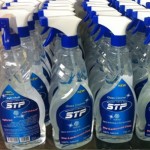| Setareh Taban Pak |

| Registration Date | 15 Feb 2016 |
| Revision Date | 19 Apr 2018 |
| Share |
Automotive Maintenance
Glass CleanerThis product is alcohol-free oil/water nanoemulsion containing spherical particles with the average size around 15 nm. The DLS result is consistent with the TEM one with pdi equal to 0.379. It is an excellent cleaner for wooden surfaces. Nanoemulsions have a much higher surface area and free energy than macroemulsions that make them an effective transport system. Nanoemulsions do not show the problems of flocculation, coalescence and sedimentation, which are commonly associated with macroemulsions. Nanoemulsions could enhance the stability of chemically unstable compounds by protecting them from oxidative degradation and degradation by light. They are transparent or translucent dispersions with ultra-low interfacial tension and long-term physical stability.
An emulsion is a mixture of two or more liquids that are normally unmixable. Emulsions are part of a more general class of two-phase systems of matter called colloids. Although the terms colloid and emulsion are sometimes used interchangeably, emulsion should be used when both phases, dispersed and continuous, are liquids. In an emulsion, one liquid (the dispersed phase) is dispersed in the other (the continuous phase). The boundary between the two phases called the "interface". Emulsions tend to have a cloudy appearance because the many phase interfaces scatter light as it passes through the emulsion. Two special classes of emulsions – microemulsions and nanoemulsions appear translucent. Nanoemulsions are emulsions with droplet size on the order of 100 nm. A typical nanoemulsion contains oil, water and an emulsifier. The addition of an emulsifier is critical for the creation of small sized droplets as it decreases the interfacial tension between the oil and water phases of the emulsion.